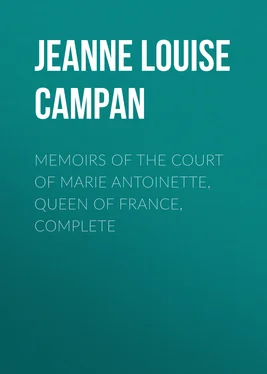Jeanne Louise Henriette Campan - Memoirs of the Court of Marie Antoinette, Queen of France, Complete
Здесь есть возможность читать онлайн «Jeanne Louise Henriette Campan - Memoirs of the Court of Marie Antoinette, Queen of France, Complete» — ознакомительный отрывок электронной книги совершенно бесплатно, а после прочтения отрывка купить полную версию. В некоторых случаях можно слушать аудио, скачать через торрент в формате fb2 и присутствует краткое содержание. Жанр: Биографии и Мемуары, История, foreign_edu, foreign_antique, foreign_prose, на английском языке. Описание произведения, (предисловие) а так же отзывы посетителей доступны на портале библиотеки ЛибКат.
- Название:Memoirs of the Court of Marie Antoinette, Queen of France, Complete
- Автор:
- Жанр:
- Год:неизвестен
- ISBN:нет данных
- Рейтинг книги:5 / 5. Голосов: 1
-
Избранное:Добавить в избранное
- Отзывы:
-
Ваша оценка:
- 100
- 1
- 2
- 3
- 4
- 5
Memoirs of the Court of Marie Antoinette, Queen of France, Complete: краткое содержание, описание и аннотация
Предлагаем к чтению аннотацию, описание, краткое содержание или предисловие (зависит от того, что написал сам автор книги «Memoirs of the Court of Marie Antoinette, Queen of France, Complete»). Если вы не нашли необходимую информацию о книге — напишите в комментариях, мы постараемся отыскать её.
Memoirs of the Court of Marie Antoinette, Queen of France, Complete — читать онлайн ознакомительный отрывок
Ниже представлен текст книги, разбитый по страницам. Система сохранения места последней прочитанной страницы, позволяет с удобством читать онлайн бесплатно книгу «Memoirs of the Court of Marie Antoinette, Queen of France, Complete», без необходимости каждый раз заново искать на чём Вы остановились. Поставьте закладку, и сможете в любой момент перейти на страницу, на которой закончили чтение.
Интервал:
Закладка:
When Madame Campan related this circumstance she added: “After the 30th of March, 1814, some officers of the army of Conde presumed to say to certain French marshals that it was a pity they were not more nobly connected. In answer to this, one of them said, ‘True nobility, gentlemen, consists in giving proofs of it. The field of honour has witnessed ours; but where are we to look for yours? Your swords have rusted in their scabbards. Our laurels may well excite envy; we have earned them nobly, and we owe them solely to our valour. You have merely inherited a name. This is the distinction between us.”
[When one of the princes of the smaller German States was showing Marechal Lannes, with a contemptuous superiority of manner but ill concealed, the portraits of his ancestors, and covertly alluding to the absence of Lannes’s, that general turned the tables on him by haughtily remarking, “But I am an ancestor.”]
Napoleon used to observe that if he had had two such field-marshals as Suchet in Spain he would have not only conquered but kept the Peninsula. Suchet’s sound judgment, his governing yet conciliating spirit, his military tact, and his bravery, had procured him astonishing success. “It is to be regretted,” added he, “that a sovereign cannot improvise men of his stamp.”
On the 19th of March, 1815, a number of papers were left in the King’s closet. Napoleon ordered them to be examined, and among them was found the letter written by Madame Campan to Louis XVIII., immediately after the first restoration. In this letter she enumerated the contents of the portfolio which Louis XVI. had placed under her care. When Napoleon read this letter, he said, “Let it be sent to the office of Foreign Affairs; it is an historical document.”
Madame Campan thus described a visit from the Czar of Russia: “A few days after the battle of Paris the Emperor Alexander came to Ecouen, and he did me the honour to breakfast with me. After showing him over the establishment I conducted him to the park, the most elevated point of which overlooked the plain of St. Denis. ‘Sire,’ said I, ‘from this point I saw the battle of Paris’—‘If,’ replied the Emperor, ‘that battle had lasted two hours longer we should not have had a single cartridge at our disposal. We feared that we had been betrayed; for on arriving so precipitately before Paris all our plans were laid, and we did not expect the firm resistance we experienced.’ I next conducted the Emperor to the chapel, and showed him the seats occupied by ‘le connetable’ (the constable) of Montmorency, and ‘la connetable’ (the constable’s lady), when they went to hear mass. ‘Barbarians like us,’ observed the Emperor, ‘would say la connetable and le connetable.’
“The Czar inquired into the most minute particulars respecting the establishment of Ecouen, and I felt great pleasure in answering his questions. I recollect having dwelt on several points which appeared to me to be very important, and which were in their spirit hostile to aristocratic principles. For example, I informed his Majesty that the daughters of distinguished and wealthy individuals and those of the humble and obscure mingled indiscriminately in the establishment. ‘If,’ said I, ‘I were to observe the least pretension on account of the rank or fortune of parents, I should immediately put an end to it. The most perfect equality is preserved; distinction is awarded only to merit and industry. The pupils are obliged to cut out and make all their own clothes. They are taught to clean and mend lace; and two at a time, they by turns, three times a week, cook and distribute food to the poor of the village. The young girls who have been brought up at Ecouen, or in my boarding-school at St. Germain, are thoroughly acquainted with everything relating to household business, and they are grateful to me for having made that a part of their education. In my conversations with them I have always taught them that on domestic management depends the preservation or dissipation of their fortunes.’
“The post-master of Ecouen was in the courtyard at the moment when the Emperor, as he stepped into his carriage, told me he would send some sweetmeats for the pupils. I immediately communicated to them the intelligence, which was joyfully received; but the sweetmeats were looked for in vain. When Alexander set out for England he changed horses at Ecouen, and the post-master said to him: ‘Sire, the pupils of Ecouen are still expecting the sweetmeats which your Majesty promised them.’ To which the Emperor replied that he had directed Saken to send them. The Cossacks had most likely devoured the sweetmeats, and the poor little girls, who had been so highly flattered by the promise, never tasted them.”
“A second house was formed at St. Denis, on the model of that of Ecouen. Perhaps Madame Campan might have hoped for a title to which her long labours gave her a right; perhaps the superintendence of the two houses would have been but the fair recompense of her services; but her fortunate years had passed her fate was now to depend on the most important events. Napoleon had accumulated such a mass of power as no one but himself in Europe could overturn. France, content with thirty years of victories, in vain asked for peace and repose. The army which had triumphed in the sands of Egypt, on the summits of the Alps, and in the marshes of Holland, was to perish amidst the snows of Russia. Nations combined against a single man. The territory of France was invaded. The orphans of Ecouen, from the windows of the mansion which served as their asylum, saw in the distant plain the fires of the Russian bivouacs, and once more wept the deaths of their fathers. Paris capitulated. France hailed the return of the descendants of Henri IV.; they reascended the throne so long filled by their ancestors, which the wisdom of an enlightened prince established on the empire of the laws.
[A lady, connected with the establishment of St. Denis, told Madame Campan that Napoleon visited it during the Hundred Days, and that the pupils were so delighted to see him that they crowded round him, endeavouring to touch his clothes, and evincing the most extravagant joy. The matron endeavoured to silence them; but Napoleon said, ‘Let them alone; let them alone. This may weaken the head, but it strengthens the heart.‘]”
This moment, which diffused joy amongst the faithful servants of the royal family, and brought them the rewards of their devotion, proved to Madame Campan a period of bitter vexation. The hatred of her enemies had revived. The suppression of the school at Ecouen had deprived her of her position; the most absurd calumnies followed her into her retreat; her attachment to the Queen was suspected; she was accused not only of ingratitude but of perfidy. Slander has little effect on youth, but in the decline of life its darts are envenomed with a mortal poison. The wounds which Madame Campan had received were deep. Her sister, Madame Auguie, had destroyed herself; M. Rousseau, her brother-in-law, had perished, a victim of the reign of terror. In 1813 a dreadful accident had deprived her of her niece, Madame de Broc, one of the most amiable and interesting beings that ever adorned the earth. Madame Campan seemed destined to behold those whom she loved go down to the grave before her.
Beyond the walls of the mansion of Ecouen, in the village which surrounds it, Madame Campan had taken a small house where she loved to pass a few hours in solitary retirement. There, at liberty to abandon herself to the memory of the past, the superintendent of the imperial establishment became, once more, for the moment, the first lady of the chamber to Marie Antoinette. To the few friends whom she admitted into this retreat she would show, with emotion, a plain muslin gown which the Queen had worn, and which was made from a part of Tippoo Saib’s present. A cup, out of which Marie Antoinette had drunk; a writing-stand, which she had long used, were, in her eyes, of inestimable value; and she has often been discovered sitting, in tears, before the portrait of her royal mistress.
Читать дальшеИнтервал:
Закладка:
Похожие книги на «Memoirs of the Court of Marie Antoinette, Queen of France, Complete»
Представляем Вашему вниманию похожие книги на «Memoirs of the Court of Marie Antoinette, Queen of France, Complete» списком для выбора. Мы отобрали схожую по названию и смыслу литературу в надежде предоставить читателям больше вариантов отыскать новые, интересные, ещё непрочитанные произведения.
Обсуждение, отзывы о книге «Memoirs of the Court of Marie Antoinette, Queen of France, Complete» и просто собственные мнения читателей. Оставьте ваши комментарии, напишите, что Вы думаете о произведении, его смысле или главных героях. Укажите что конкретно понравилось, а что нет, и почему Вы так считаете.












